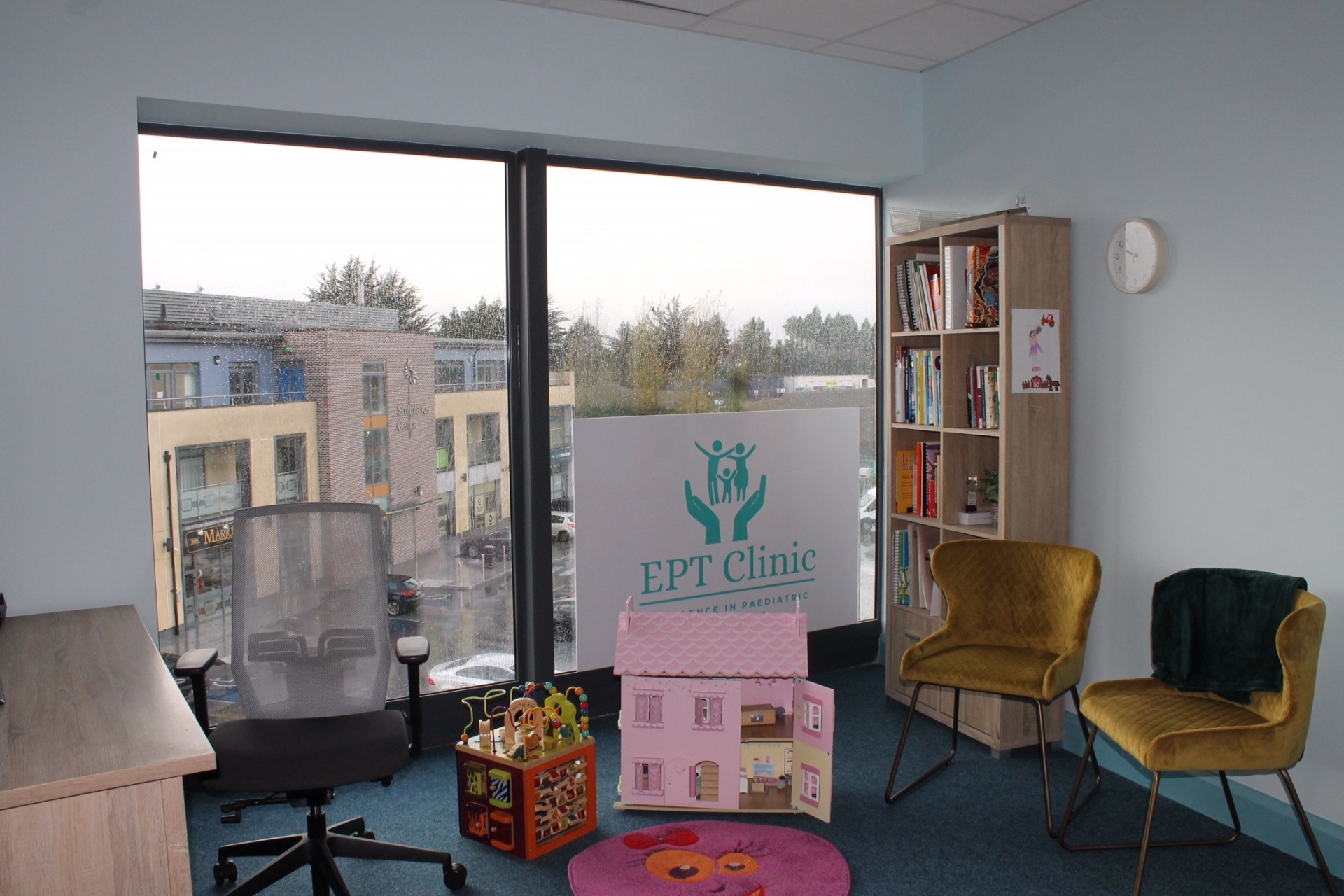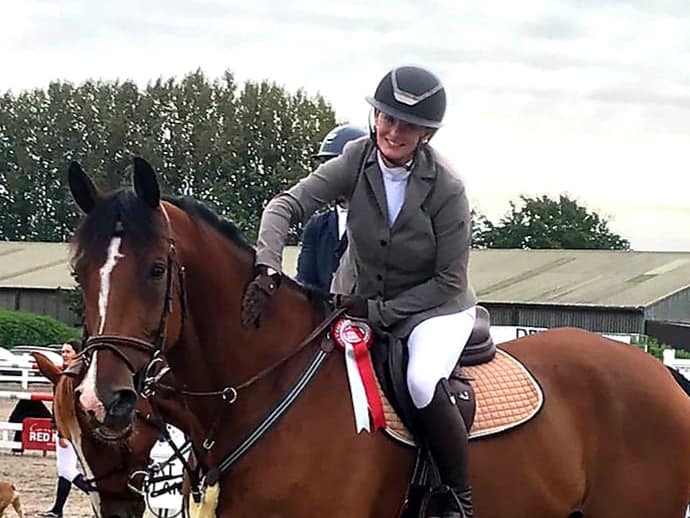
Founder of EPT Clinic Lorraine O.B. Madden is the clinic’s Clinical Director and Principal Chartered Educational Psychologist (C.Psychol., Ps.S.I. M6672C).
In 2022, Kilkenny psychologist Lorraine Madden became one of the youngest recipients of the Contribution to Professional Practice Awards, from the Psychological Society of Ireland.
Lorraine runs her own practice in Kilkenny city called the EPT Clinic. EPT stands for EDUCATION, PSYCHOLOGY AND THERAPY CLINIC which is based in The Smithlands Centre. With numbers on the rise of children suffering from mental health concerns, this award-winning healthcare provider was established in 2019, following Lorraine’s transition from HSE services into private practice.
Lorraine Madden’s EPT clinic offers one of the only paediatric neurodevelopmental and mental health services in Ireland, providing differential diagnostic clinical and healthcare assessments and therapy to children of all ages (1-18 years) and of all ability levels across Ireland and the UK, with a mix of online and in person services- all under one roof.
Here is a glimpse into Lorraine’s world of psychology…
Lorraine, Ireland is in crisis when it comes to helping children with neurodevelopmental issues. What are the cold hard facts?
According to the Report to the Minister of State for Disability at the Department of Children, Equality, Disability, Integration and Youth, published in respect of data collected in 2022, the HSE received 6,755 applications in 2022 for services, an increase of 15% from 2021.
Further to this, there were 4,116 applications starting stage two of the process during 2022 and further applications overdue from previous years.
This equates to thousands of children and families waiting for services – a waiting list crisis.
The HSE estimate that roughly 3.5% of the child population require specialist disability input from multidisciplinary children’s Disability Network Teams while a further 0.5% with non-complex needs (or complex needs requiring single discipline rather than interdisciplinary team input due to their disability) are likely to require Primary Care episodic interventions.
In June 2023, the Final Report of the Joint Committee on Autism (House of the Oireachtas, 2023), noted that autistic people continue to experience difficulties in Ireland accessing support and services, particularly in the areas of disability services and education.
The committee also found that many public services are completely inaccessible to autistic people due to a lack of availability or services that are not designed with autistic people in mind. The report recommended that it is essential that services are designed with all neurotypes in mind and that services that directly impact on the lives of autistic people are designed in collaboration with the community.
 EPT Clinic in The Smithland Centre
EPT Clinic in The Smithland Centre
So is this why you open the EPT Clinic?
After spending time as both a primary school mainstream teacher and then a special education teacher in learning support, and then moving on to working in the HSE, I could see that families and children were really struggling to manage all the different pathways that are set up in Ireland to access services.
So, if you have mental health needs, you have to go to one place. If you have neurodevelopmental differences, then you must go to a different team. If your needs are seen to be milder, you have to go to another team. And then if you have learning difficulties or dyslexia, you go to a different service altogether.
It's really hard for families to manage all these different referral pathways.
My idea was to have everything under one roof with one service. So that there was one entry point, with one referral pathway, where all of a child's needs could be met holistically within the one team.
I also wanted to achieve excellence in healthcare because there are difficulties with the regulation of private services in Ireland currently- as evidenced by the Prime Time Investigates into psychologists recently. EPT Clinic aligns with the World Health Organisation, and the National Institute for the Clinical Application of Behavioural Medicine’s guidelines for professional practice. The clinic also works in partnership with the HSE and Tusla and aligns with national and international best practice guidelines.
Is everyone on the spectrum?
No, and I know this is controversial for people who have a different neuro type, a neurodivergence really does influence people’s life.
However, do I think everybody has a different type of brain and body? Yes, that’s for sure. The idea that we had decades ago of there being one main type of brain and body, and then a deviation from that type was unusual is quite outdated now.
Nowadays, we celebrate diversity in everybody's brain from six months old, right up to old age.
There are certain neuro types that have key characteristics that unite people in their experience and their view of the world. There's lots of different neurotypes, like autism, ADHD, dyslexia, dyspraxia.
What issues are you seeing more on the rise for families?
Life has become quite complicated for parents and for children. It is very busy, and people have a lot going on with extracurricular activities every day.
That puts parents under pressure, with driving and organising things, trying to fit in work and parents’ own time for regulation.
It means that there's not a lot of downtime in families. At EPT, this is often the starting point with families, trying to unpack what can go to make more time for regulation and relaxation.
We support families to build in a little bit more downtime, for just hanging out, maybe sitting at home, spending a little bit of time around the table or out in the garden or going for a walk in the woods.
Research indicates that having that downtime, and being regulated is really important. It's important on three levels - for the young person to have their own regulating activities, for the parents to have their own activities separate, but then also together as a family.
That's another bit of homework I often get parents to do i.e., schedule just time together for themselves as a couple, and then as a family too.
Of course, the phones, social media and IT are also big intruders on regulating downtime in families.
It's hard to be a parent at the moment, there's a lot to juggle.
-1702072494522.jpg) Lorraine Madden is one of the youngest recipients of the Contribution to Professional Practice Award
Lorraine Madden is one of the youngest recipients of the Contribution to Professional Practice Award
You are currently one of the youngest recipients of the Contribution to Professional Practice Awards, from the Psychological Society of Ireland (PSI). That’s some achievement.
It was an honour to have been selected. I think I was quite young, in terms of the other psychologists that have been recipients of that award.
There were a few things that were noted when they gave me the award. One was the work I did for over three years, as part of the committee that wrote the new professional practice guidelines for the assessment formulation and diagnosis of autism in children and adolescents. This huge piece of work was published by the Special Interest Group in Autism in April 2022.
Secondly, the PSI were interested in what we are doing at EPT Clinic here in Kilkenny. In particular, the specialist neurodevelopmental services and pathways that we have developed. I understand we're one of the only services in Ireland that offer that.
Thirdly we are also one of the only services in Ireland that offer a neurodevelopmental specialist trauma and attachment service. So, we offer specialist assessments for children in care, who would usually be in the care of Tusla - the Child and Family agency. Those assessments look at the impact of adverse childhood experiences, which are traumatic events that children can face early on in life.
We would look at the impact of those experiences, and the associated relational ruptures, and how it affects children’s learning, their sensory system, their social development, emotional and psychological development. We would then advise the Tusla team, the caregivers, teachers and often their biological parents on how to support the child moving forward.
 Lorraine Madden enjoying some quality downtime with her horse
Lorraine Madden enjoying some quality downtime with her horse
I always wonder how people in your profession leave their days work at the office. It must be very hard not to carry home with you some of the issues you’ve worked on throughout the day.
There are times when you do think about the children you work with, that's for sure. I think it's important to have things built in as a clinician to regulate yourself. So, for example, for me, I try to get home before I collect the kids. I have two stables in our yard out the back, and I really enjoy mucking out, feeding and riding my horse. It's a bit of a decompression before I collect the kids.
Building in something like that is really important. Also, my husband and I protect time ourselves, to do things together and then we do things as a family. I think that when you try to be in the moment, and practice what you preach, you do learn to turn off from some of the things.
Psychologists also do clinical supervision, so psychologists maintain a Chartership level with the PSI where you have to engage in your own clinical supervision or therapy.
For you have any queries or concerns for Lorraine, you can contact her and her team on https://eptclinic.ie
Subscribe or register today to discover more from DonegalLive.ie
Buy the e-paper of the Donegal Democrat, Donegal People's Press, Donegal Post and Inish Times here for instant access to Donegal's premier news titles.
Keep up with the latest news from Donegal with our daily newsletter featuring the most important stories of the day delivered to your inbox every evening at 5pm.